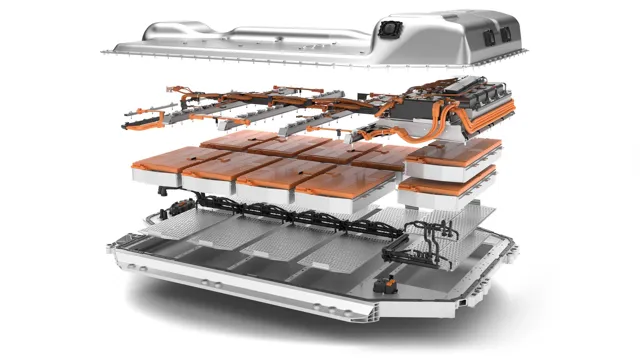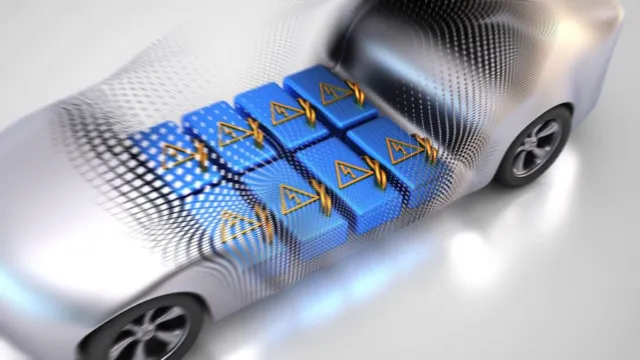Revolutionizing the Road: A Closer Look at Electric Car Battery Projections and Costs
Electric cars have been gaining popularity in recent years as people become more aware of the environmental impacts of traditional gasoline-powered vehicles. One major factor that has limited the mass adoption of electric cars has been the cost of their batteries. However, with advancements in technology and increased production volume, the cost of electric car batteries is projected to decrease significantly in the coming years.
In this blog post, we will explore the current cost of electric car batteries, as well as predictions for how much they will cost in the future. So buckle up and join us as we take a deep dive into the fascinating world of electric car battery cost projections.
Current Cost of Electric Car Batteries
Electric cars are becoming increasingly popular as a more environmentally friendly alternative to traditional gasoline vehicles. One of the main factors driving adoption is the falling cost of electric car batteries. In recent years, the cost of electric car batteries has dropped significantly, and projections show that it will continue to fall over the coming years.
According to industry reports, the cost of electric vehicle batteries per kilowatt-hour has fallen by around 80% over the past decade. This is due in part to advancements in technology, improved manufacturing processes, and economies of scale as demand for electric vehicles has increased. Experts predict that by 2025, the cost of electric vehicle batteries could drop below $100 per kilowatt-hour, making electric cars more affordable for a wider range of consumers.
As battery costs continue to fall, we can expect to see more widespread adoption of electric vehicles in the coming years, with a growing number of consumers choosing electric over traditional gasoline vehicles.
Overview of current battery costs
Electric car batteries have come a long way in the past few years, particularly when it comes to cost. Today, the average cost of an electric car battery pack is around $137 per kilowatt-hour (kWh), down from nearly $1,200 per kWh in 20 This decrease in cost has made electric vehicles more affordable and accessible to consumers.
Despite the decrease in cost, battery prices are still one of the biggest factors that affect the price of electric cars. The cost per kWh varies depending on the type of battery and the manufacturer, with some batteries costing as much as $250 per kWh. However, with a growing demand for electric cars and advancements in technology, battery costs are likely to continue decreasing in the coming years.
Factors affecting electric car battery costs
The cost of manufacturing electric car batteries has been a significant factor hindering widespread adoption of electric vehicles. As of 2021, the average cost of lithium-ion batteries used in electric cars is around $137/kWh. However, this cost is expected to decrease rapidly in the coming years due to several reasons.
Firstly, advancements in battery technology and economies of scale in manufacturing will drive down costs, making electric cars more affordable. Secondly, government policies providing tax incentives for electric car production and use will encourage car manufacturers to invest more in electric technology. Lastly, increased competition in the market will also play a crucial role in driving down prices.
As more car manufacturers enter the electric market, the competition will not only bring down costs but also lead to more innovation in battery technology. Although the initial cost of electric car batteries may seem high, the long-term benefits such as reduced emissions and lower maintenance costs justify the investment.
Predictions for Future Battery Costs
Battery costs have come down significantly in recent years, and it looks like that trend will continue. According to BloombergNEF, the cost of electric car batteries is expected to fall by 58% by 2030. This is a significant drop from the average cost of $137/kWh in 2020 to a projected cost of just $58/kWh.
If these projections hold true, it could mean that electric vehicles may become cost-competitive with internal combustion engine vehicles much sooner than expected. One factor contributing to this drop is the increased production of batteries, which leads to economies of scale and lower costs. Advances in battery chemistry and manufacturing are also helping to make batteries cheaper and more efficient.
As more manufacturers enter the EV market and battery technology continues to improve, it seems likely that battery costs will continue to fall, making EVs even more accessible to consumers.
Projected decrease in battery costs
The future looks bright when it comes to battery costs. Many experts predict that the price of batteries will continue to decrease in the coming years, making them more accessible to the general public. This decrease in cost is due to many factors, including advancements in technology that make battery production more efficient.
In addition, as more and more people embrace the use of electric vehicles, the demand for batteries is increasing, which in turn is driving down prices. This trend is expected to continue, and it could potentially lead to a significant decrease in the price of batteries over the next decade. Ultimately, this decrease in cost will make batteries a more viable option for a wide range of uses, including powering homes and businesses, as well as helping to combat climate change by transitioning away from fossil fuels.
As the cost of batteries continues to decrease, the possibilities for their use are endless.
Reasons for cost reductions
Battery cost reductions have been an ongoing trend in recent years, driven by a variety of factors such as economies of scale, improved technology, and increased competition. While current battery costs are still relatively high, industry analysts predict that the cost of lithium-ion batteries will continue to decline in the near future. Some estimates suggest that battery costs could drop by as much as 50% by 2025, with further reductions expected as demand continues to grow.
This is great news for electric vehicle (EV) manufacturers and consumers alike, as it will help to make electric cars more affordable and increase the adoption rate of EVs. As the cost of batteries fall, EVs will become increasingly cost competitive with traditional gas-powered cars, making them a more attractive option for the average consumer. Overall, the future looks bright for battery cost reductions and the growth of the EV market.
Potential impact on electric car adoption
The future of electric cars looks bright as predictions for future battery costs suggest that their adoption will significantly increase. With advancements in technology, the cost of producing batteries is predicted to reduce, resulting in more affordable electric cars. This reduction in cost can also be attributed to the increase in battery production capacity as manufacturers compete to supply the growing demand for electric vehicles.
The potential impact of this on electric car adoption is immense, with more people considering the switch to electric cars as a cost-effective and environmentally friendly alternative. It is believed that in the near future, electric cars will become the norm rather than a luxury item. This transition will be accelerated by the reduction in battery costs, making electric cars accessible to a broader demographic.
As more people adopt electric cars, the reduction in greenhouse gas emissions will significantly reduce the carbon footprint, making electric cars the savior of the environment.
Comparison with Gasoline Vehicles
The cost of electric car battery projections seem to be causing quite a stir in the automotive world. Many people are wondering how electric vehicles compare to gas-powered cars in terms of cost, and it’s safe to say that electric cars are becoming more affordable as technology progresses. While upfront costs for electric cars may be higher than traditional cars, the amount of money saved over time through fuel and maintenance costs can add up to significant savings.
Additionally, projections suggest that battery costs will continue to decrease over time, making electric cars even more cost-effective in the long run. It’s important to note that while electric vehicle battery prices are projected to keep dropping, it’s impossible to predict with complete accuracy how much they will decrease. Nonetheless, experts predict that these prices will continue to drop at a significant rate, making electric vehicles an increasingly appealing and practical option for drivers looking to save on costs and reduce their carbon footprint.
Cost comparison of electric and gasoline vehicles
When it comes to comparing electric vehicles (EVs) and gasoline vehicles (GVs), the most significant difference lies in their fuel costs. While EVs require electricity to run, GVs need gasoline. In the United States, the average cost of a gallon of gasoline is around $
00. With an average fuel efficiency of around 25 miles per gallon (MPG), a driver needs to spend $12 to drive a distance of 100 miles. On the other hand, the average cost of electricity is around $0.
13 per kilowatt-hour. With an average EV efficiency of 3 miles per kilowatt-hour, it costs only $33 to drive a distance of 100 miles.
This means that EVs can save you almost $67 for every 100 miles driven. Furthermore, maintenance for EVs is usually less expensive than GVs due to fewer moving parts.
Overall, electric vehicles may initially seem like a more expensive option, but they can save you money in the long run.
How battery cost reductions affect overall cost savings
Battery cost reductions have been a driving force in the adoption of electric vehicles (EVs) as a viable alternative to gasoline vehicles. A significant cost difference between the two is the initial purchase price. EVs often come with a higher purchase price.
Still, the long-term operational costs are much cheaper due to lower maintenance and fuel costs. As battery technology advances and becomes more affordable, the overall cost differential between EVs and gasoline vehicles continues to decrease. It is estimated that battery prices have declined by roughly 87% in the past ten years, and this trend is likely to continue as economies of scale continue to lower costs.
As a result, electric vehicles are becoming an increasingly attractive option for those looking to reduce their overall transportation costs.
Conclusion
In conclusion, projecting the cost of electric car batteries is a constant exercise in balancing science, economics, and creative crystal ball gazing. It’s both a game of numbers and a battle of wits that EV enthusiasts, car manufacturers, and battery makers fight every day. One thing is for sure, however.
As technology continues to advance and economies of scale kick in, the cost of electric car batteries is set to take a nosedive. So buckle up, charge your ride, and get ready to witness the electrification of our roads as we know them!”
FAQs
What are the current projections for the cost of electric car batteries?
The current projections suggest that the cost of electric car batteries will continue to decrease, with some estimates showing that battery pack prices could reach $100 per kWh by 2023.
How has the cost of electric car batteries changed over time?
The cost of electric car batteries has decreased significantly over time, with estimates showing that battery pack prices have fallen from around $1,000 per kWh in 2010 to around $137 per kWh in 2020.
What factors are driving the decreasing cost of electric car batteries?
There are several factors driving the decreasing cost of electric car batteries, including advances in battery technology, economies of scale, and increased competition among battery manufacturers.
How will the decreasing cost of electric car batteries impact the adoption of electric vehicles?
The decreasing cost of electric car batteries is expected to significantly increase the adoption of electric vehicles, making them more affordable and accessible to a wider range of consumers.





